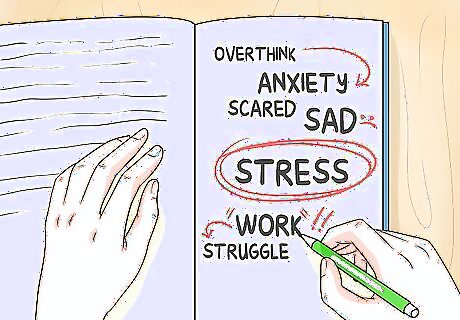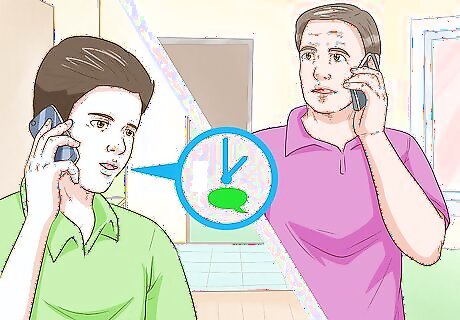
views
Making Sure You’re Ready to Talk

Know the warning signs of depression. Everyone feels sad every now and then. It could be a sign of something deeper if it's been going on for a while. If you’ve been feeling bad for more than 2 weeks, you might be depressed. Depression is very common, and you can manage it. But you first need to think about whether you have some of these common symptoms: Feeling sad or hopeless Losing interest in things you enjoy Feeling lonely Experiencing changes in eating or sleeping habits Feeling tired for no clear reason Having trouble concentrating Having thoughts of hurting or killing yourselfIf you've had thoughts of hurting yourself, call and talk to someone right away. In the US, call the Suicide and Crisis Lifeline at 988, or text CONNECT to 741741 if talking on the phone seems too hard. If you live in another country, visit http://www.suicide.org/international-suicide-hotlines.html to find the number you can call.

Allow yourself to process your emotions. If you’re experiencing symptoms of depression, you’re going through a really tough time. Remember that it is okay to feel whatever emotions you are going through. If you’re sad, allow yourself to feel sad. But know that it is important to get help. Start thinking about what would make you feel better. It will probably make you feel less lonely if you share your story with someone. Give yourself a pep talk and remind yourself that it is okay to ask for help.

Plan what you want to say. You might be feeling nervous to tell someone about your struggle. That’s normal! It might make you feel more at ease if you plan what you want to say ahead of time. Write it down so that you can organize your thoughts. You can jot down main points like “scared”, “sad”, “emotional” or you can try writing down what you want to say word for word. Even if you don’t want to write everything down, try picking an opening line. It could be “I’ve been really struggling lately and I think I’m depressed. I’d like to talk to you about that if that’s okay with you.”

Choose one trusted person to tell. Depression is really personal, so don’t feel like you have to share this with everyone. But you will probably feel better if you confide in someone supportive. Start by picking one person to tell. It should be someone who you trust, is non-judgemental, and is a good listener. If you’re young, you might want to tell your parents. In that case, two people are fine! Or you could pick one parent to start with. If you’re in a relationship, it might be a good idea to tell your partner so they can support you. Anyone that you trust is a good choice. This could be a relative, friend, mentor, coach, teacher, or even your doctor.
Having a Positive Conversation

Start by asking if they have time to talk. You can begin the conversation by making sure this is a good time for the other person. Say something like, “Do you have time to talk for a while?” If they say it’s not a good time, ask when would be good for them. You can also schedule the time in advance so that you know the other person will be available. Try to avoid really busy times, such as when your parents are cooking dinner or your partner is trying to head out to work.

Choose a place where you feel comfortable. Once you’re ready to talk, choose a spot where you will feel at ease. This could be a room in your home or a favorite coffee shop. Ask your trusted person to meet you there. You could say, “Will you come into my room and talk to me for a bit?” You could also say, “I have something I’d like to tell you. Can you meet me at the coffee shop on the corner?”

Use a pop culture reference if you are nervous to bring up the subject. Talking about depression might feel awkward at first. A good way to break the ice is to bring up a relevant pop culture reference that the other person will understand. You could mention a character in a book or movie that deals with depression or other tough emotional issues. For example, you could say, “Do you remember when we watched ‘’Garden State’’ together? I’ve been going through something similar.” If you’re both Harry Potter fans you could start by saying, “You know how Harry feels when the Dementors are around? I’ve been feeling emotions like that recently.”

Describe what depression feels like to you. Once you’ve opened the conversation, let the other person know exactly what you are going through. Depression is different for everyone, so help them understand your unique situation by describing your feelings. You could say, “I am just exhausted. It is hard for me to even find the energy to get out of bed in the mornings.” Maybe you could also describe other feelings. Try saying, “I feel sad all of the time. I’m not even able to laugh at my favorite shows anymore.” Giving specific examples will help the other person to understand what you’re going through.

Be ready to answer questions. The other person might want to learn more about your situation. If they start asking lots of questions, remember that they are just seeking to understand what you’re going through. They might ask you to give some other examples of how you’re feeling, or how long this has been going on. They might ask how they can help you. Be clear about what you need. Say, “Maybe we could meet each week to take a long walk? That would be something for me to look forward to.” If they ask something that feels too personal, you can just say, “I really don’t want to talk about that. Thanks for understanding.”
Getting the Support You Need

Follow up with the other person and let them help you. Stay in touch with the trusted person after you have your talk. They’ll likely be concerned and want to know that you’re okay. You don’t have to keep talking about depression if you don’t want to, but even a simple “I’m doing okay today” text can keep the lines of communication open. Hopefully, they ask to support you. If they offer help, allow them to be supportive. Even getting together to watch a funny movie might help you feel a little better.

Choose another person to tell if you feel ready. Now that you’ve broken the ice, you might want to think about telling someone else. The more supportive people you have in your life, the better. However, don’t feel pressured to tell everyone. You don’t have to share your personal business with everyone in your life. The next person you tell can be anyone you want. Consider a family member, trusted friend, teacher, or coach.

Move on to someone else if your talk didn't go well. You might be upset if the conversation doesn't go how you want. That's normal. If the person wasn't supportive or was judgemental, that's a reflection of them, not you. Take a few days to heal, and then try again with someone else. Choose someone else to tell and hope that they are more understanding.

Get professional help if you need additional support. You don’t have to go through this alone. There are a lot of resources out there for you. You might consider going to therapy. A mental health care professional can help you find coping mechanisms. You can also try calling a chatline, such as The National Alliance on Mental Illness (NAMI). You can reach them at 1-800-950-NAMI.

















Comments
0 comment